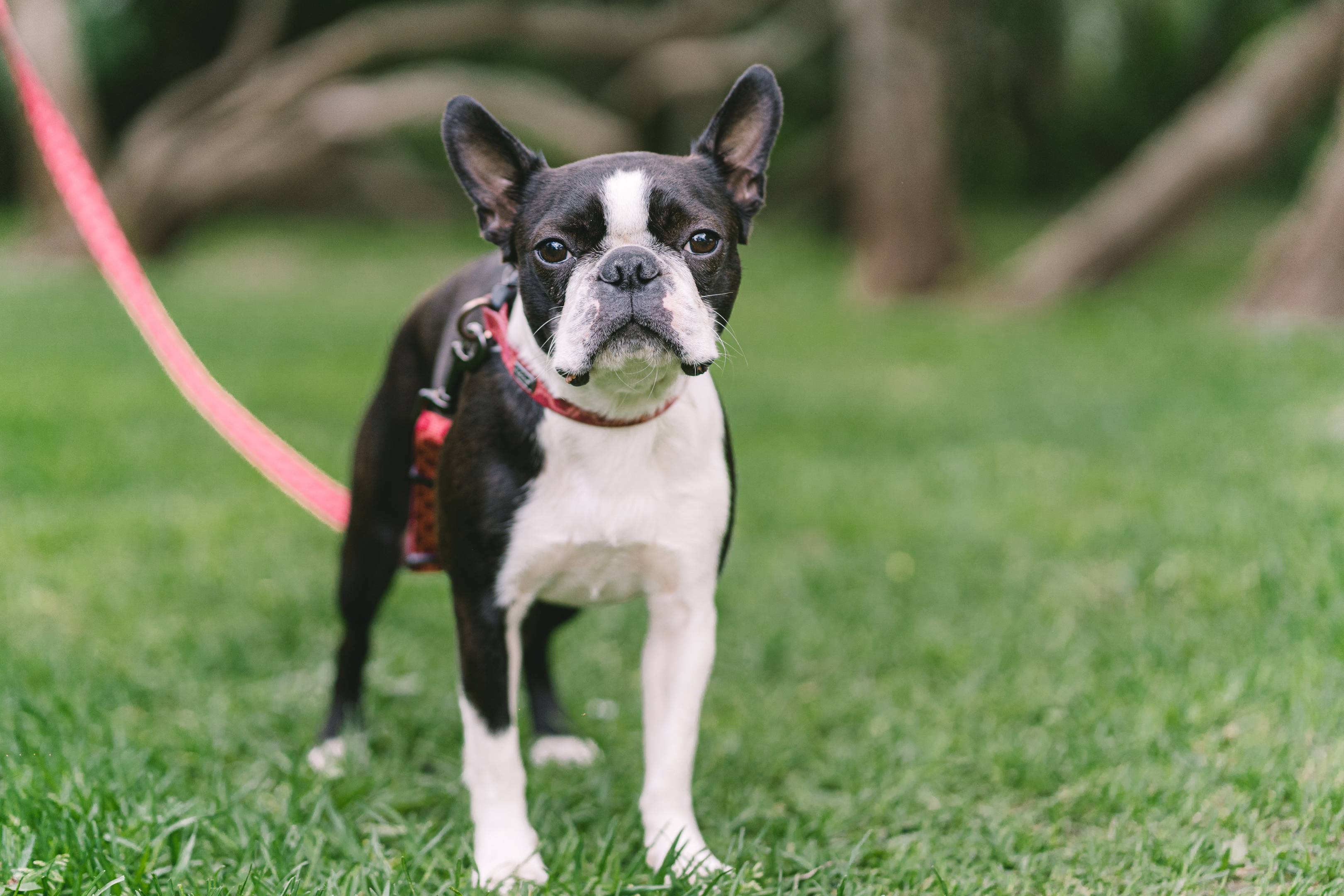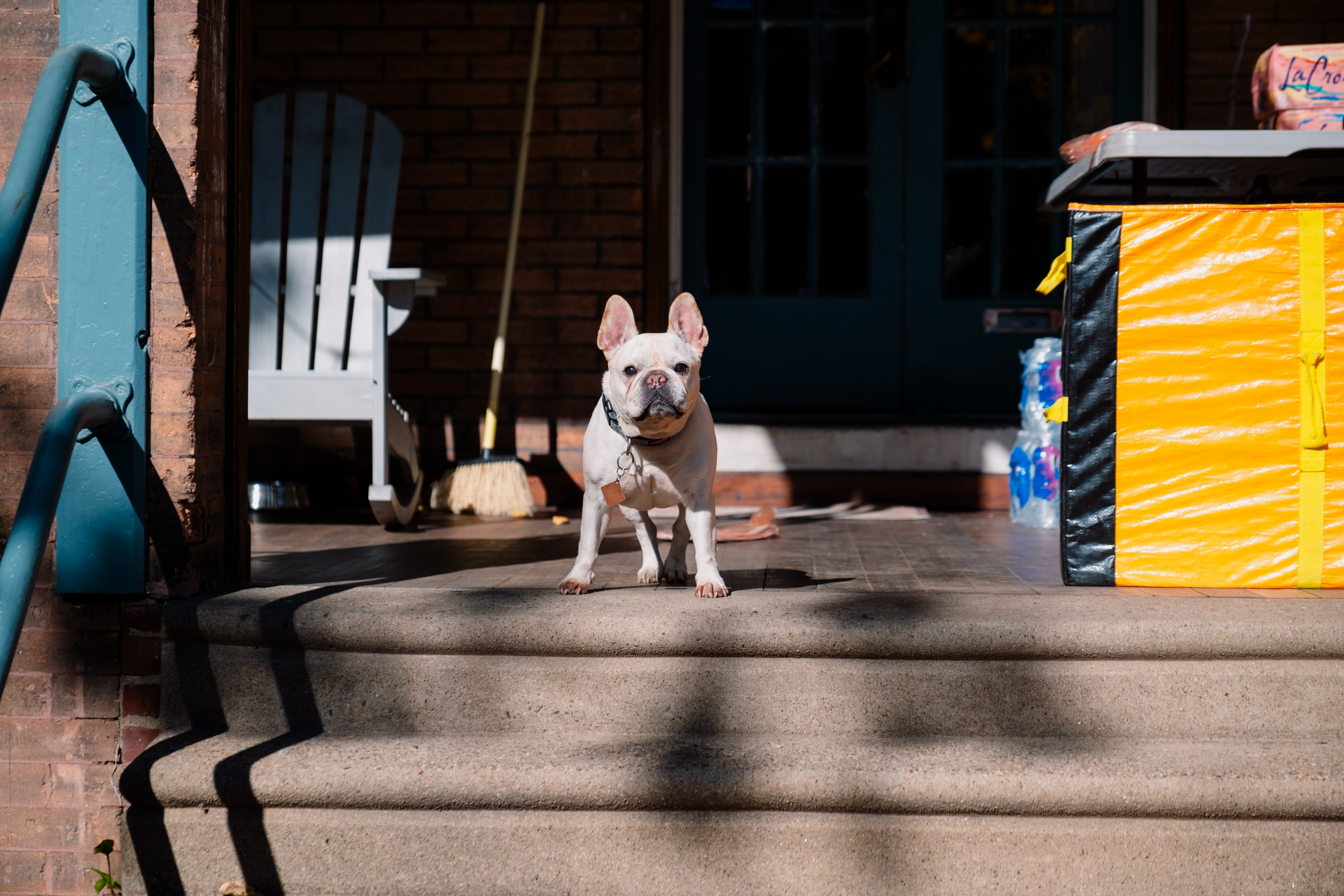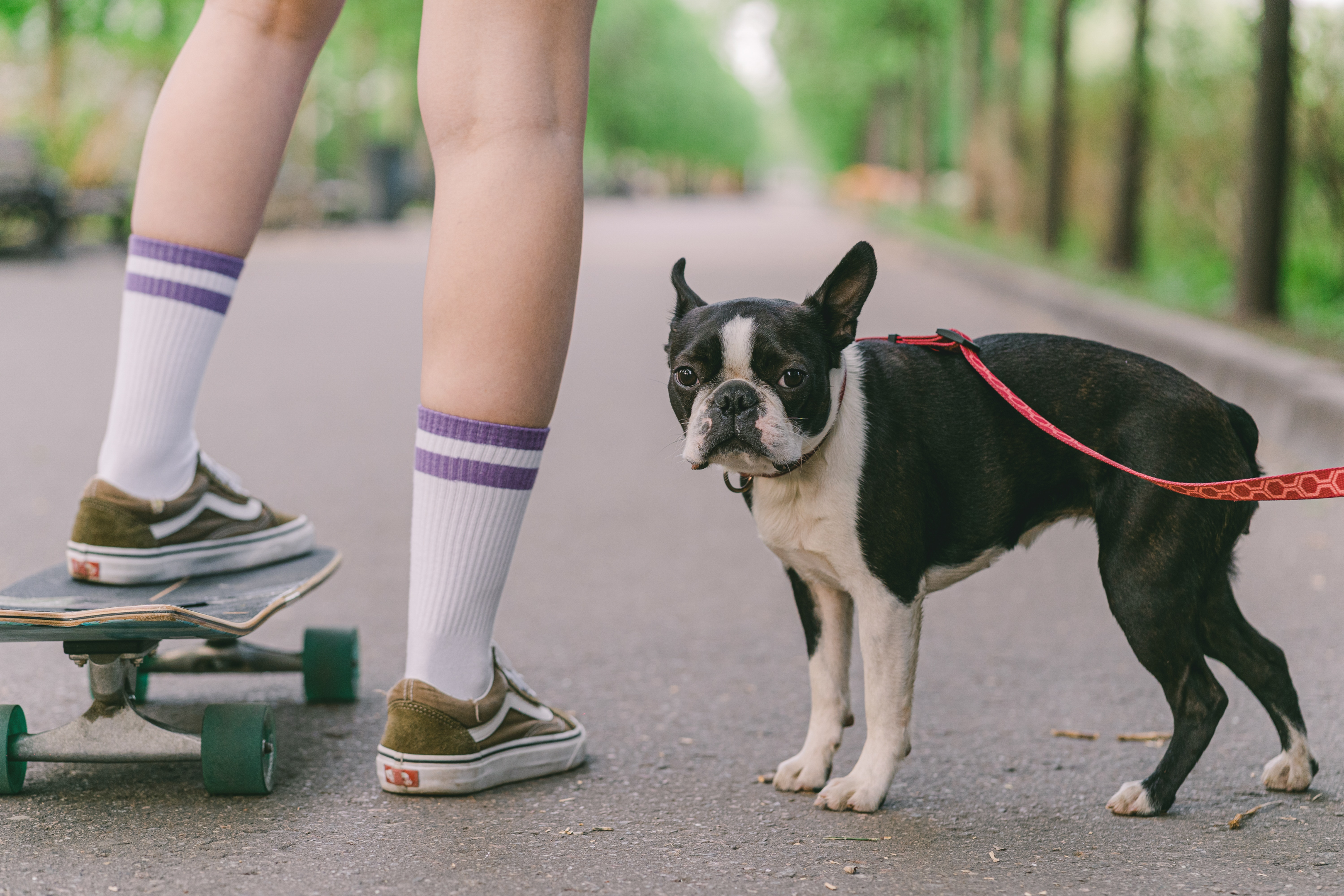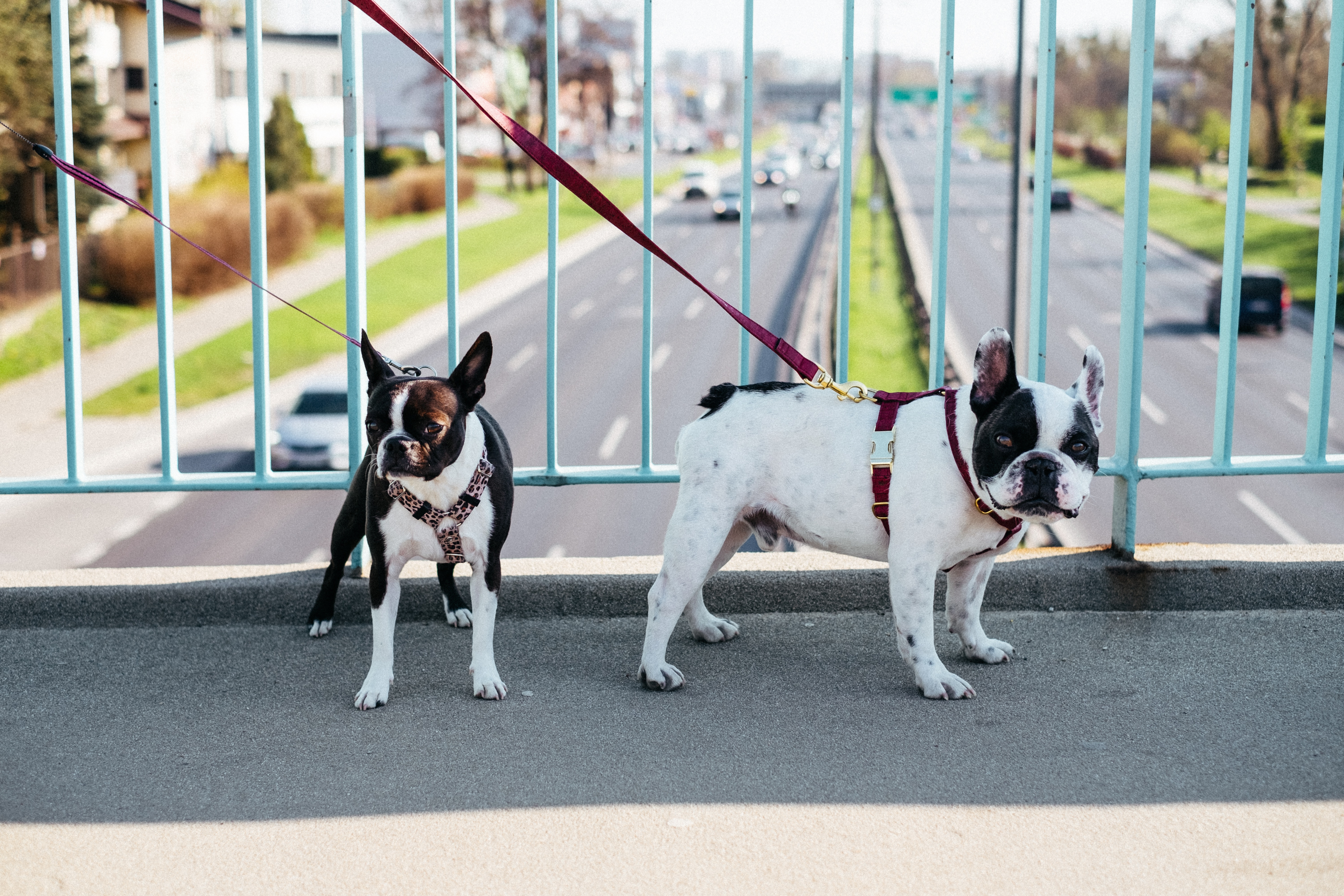Mental Stimulation Strategies for Senior Boston Terriers
Just like all dog breeds, regular mental stimulation is closely connected to a Boston Terrier's overall health. This especially applies to older Boston Terriers that are already in their senior years. And similar to other dogs, an aging Boston Terrier could be in for a number of health issues sooner or later if he isn't being mentally stimulated like he should.
If you're a Boston Terrier owner and still having a hard time getting in on useful information about how to provide mental stimulation to your aging pooch, then you've come to the right place. Make sure you follow along because we will walk you through everything you need to know about keeping your senior dog mentally-stimulated to support his aging process.
Why Mentally Stimulating Your Senior Boston Terrier is Crucial
 Unlike what a lot of dog parents mistakenly think, mental stimulation isn't just for puppies and younger pooches. The truth is older dogs need it as much as their younger counterparts. And the lack of it can make them vulnerable not just to behavioral issues, but also to serious health problems before you know it.
Unlike what a lot of dog parents mistakenly think, mental stimulation isn't just for puppies and younger pooches. The truth is older dogs need it as much as their younger counterparts. And the lack of it can make them vulnerable not just to behavioral issues, but also to serious health problems before you know it.
Brain stimulation amounts to exercise when this dog breed is concerned
As high-energy dogs, Boston Terriers love to be engaged in activities that get both their body and mind going. This is the reason why integrating mentally-stimulating games and pastimes in their exercise routine is a must no matter how old they may be. Many pet parents tend to immediately scratch off mental stimulation from their checklist as soon as their Boston Terrier reaches a particular age.
While senior Boston Terriers like to play fetch and tug of war, you'll be surprised how much they're going to enjoy being engaged with interactive toys and games where brain power is a factor like hide-and-seek as well as going through an obstacle course.
Taking things slow and easy is the way to go
However, although mental stimulation regular exercise should be a priority in your checklist, keep in mind to take things down a notch as regards intensity and frequency when engaging your dog in these kind of activities. Too much of it can possibly lead to injury, such as joint problems, in these golden-aged dogs.
Additionally, old age in Boston Terriers already affects your dog's attention span, overall responsiveness to his surroundings, as well as his energy levels. We also recommend having these games and activities involving problem-solving skills and mental power played indoors.
The Dangers of the Lack of Brain Stimulation as a Boston Terrier Ages
 Similar to other dogs, depriving your senior Boston Terrier of brain stimulation can lead to all sorts of wellness issues and health problems sooner or later. What's really alarming is that some of these concerns don't even show up during regular health check-ups!
Similar to other dogs, depriving your senior Boston Terrier of brain stimulation can lead to all sorts of wellness issues and health problems sooner or later. What's really alarming is that some of these concerns don't even show up during regular health check-ups!
Organizations like the American Kennel Club emphasize that it's your responsibility as a dog owner to ensure that your older Boston Terrier has adequate brain stimulation each day. Without further ado, here are the risks that your furry friend is potentially prone to if he's not stimulated mentally as he should:
Abrupt detachment and indifference
Regardless of age, small dogs like Boston Terriers have very high social skills and love to bond with their pooch parents. They're almost always seen clinging to their dog moms and dads hoping to be engaged in some form of physical activity or exercise routine like playing fetch or a daily walk. These dogs also excel when signed up for an obedience class due to their inquisitive nature.
One of the biggest reasons why these dogs love to get moving—while having mental enrichment at the same time—is they use it as an opportunity to get rid of pent-up energy levels. When these are not properly dealt with, they tend to encourage the rapid escalation of stress hormones, which can make your dog aloof and seemingly bored even toward his favorite toys and activities.
Sudden aggression and destructive behavior
 Now that we've covered the part about excess energy not being properly handled, many dogs including Boston Terriers are prone to aggression and destructive behavior when they're not stimulated mentally on a regular basis. And these negative changes in behavior can progressively worsen over time if not immediately and properly managed.
Now that we've covered the part about excess energy not being properly handled, many dogs including Boston Terriers are prone to aggression and destructive behavior when they're not stimulated mentally on a regular basis. And these negative changes in behavior can progressively worsen over time if not immediately and properly managed.
Besides chewing on the furniture and unnecessarily digging in the backyard, your older dog can also display sudden hostility to other people and other pets in your household, not to mention other dogs he may encounter in the dog park.
Developing an attention-seeking disposition
An older Boston Terrier that lacks the right amount of brain stimulation will often exhibit attention-seeking behavior. While this typically involves gestures like gently biting on articles of clothing and repeated barking to make his presence known, this can also lead to unexpectedly messy activities like urinating or defecating in the kitchen or living room.
Unexpected hostility can also be an issue
Moreover, he may also display sudden bouts of hostility toward other animals that may be in your home. Should you notice your senior Boston Terrier acting more clingy than usual, it is a great idea to consider it as a possible cry for help and not just some temporary phase.
Restlessness and urge to escape
As we've highlighted earlier, excessive amounts of stress hormones can make your senior Boston Terrier prone to boredom, which usually results in anxiety in most cases. Besides setting off negative behavior in older dogs like engaging in destructive acts such as munching on furniture, anxiety can also induce in your aging Boston Terrier's mind the need to run away.
While observing your senior dog scratching on the doors and windows or becoming suddenly animated when he sees other dogs outside is quite normal, he may be already going through anxiety if these episodes become more frequent and overly excited.
Unwanted weight gain and vulnerability to health issues
 Did you know that if you don't give your senior Boston Terrier the brain stimulation he needs, your dog will resort to other activities to deal with his pent-up energy? And one of these activities is excessive eating, which can make your dog prone to obesity along with the problems to his overall health that this condition can eventually trigger.
Did you know that if you don't give your senior Boston Terrier the brain stimulation he needs, your dog will resort to other activities to deal with his pent-up energy? And one of these activities is excessive eating, which can make your dog prone to obesity along with the problems to his overall health that this condition can eventually trigger.
Apart from putting aging Boston Terriers at risk of heart disease, other negative effects of obesity in dogs include joint issues, respiratory problems, susceptibility to infections, skin disorders, as well as inflammatory complications like gum disease, coughing and difficulty hearing due to poor circulation.
Accelerated cognitive decline
Failing to mentally stimulate your golden-aged Boston Terrier makes him extremely vulnerable to Canine Cognitive Dysfunction (CCD), which is often compared to dementia in humans. This condition is often characterized by progressively worsening bouts of behavioral changes, confusion and even memory loss in some cases.
Strategies on How to Stimulate Your Boston Terrier Mentally
 For this part of our discussion, let's go over some useful and practical strategies that you can use to provide your aging Boston Terrier the brain stimulation he needs in his golden years. You'll be surprised with how easy you can pull the whole thing off, too. Below are the things you should include in your daily pet checklist:
For this part of our discussion, let's go over some useful and practical strategies that you can use to provide your aging Boston Terrier the brain stimulation he needs in his golden years. You'll be surprised with how easy you can pull the whole thing off, too. Below are the things you should include in your daily pet checklist:
#1. Go for toys that encourage your aging pooch to think and explore.
Integrating puzzle toys in your senior Boston Terrier's daily routine will not just help keep his mind sharp, but also curb cognitive decline in the process. What's really interesting is there are already puzzle toys available these days that are designed to add a dimension of critical thinking and problem-solving when playing fetch or tug-of-war.
Additionally, some interactive toys can also be used for hiding treats or tidbits to support a balanced diet. There are even a few models that can engage your older pooch in low-impact exercise just by a touch of a button.
#2. Set up a simple age-appropriate obstacle and agility course.
Boston Terriers love obstacle and agility courses because they like to showcase their speed and nimbleness. Setting one up will definitely excite your aging Boston Terrier, especially if it involves a variety of jumps and hurdles that he can negotiate as he goes along.
Unlike what a lot of people mistakenly believe, putting up an agility or obstacle course for your pet isn't that complicated. You can even make one indoors! All you need are some pillows, a chair or two, a few blankets and his favorite toys.
As an alternative option, there are dog parks in your area that already have obstacle and agility courses. Just remember to keep things nice and easy for your older Boston Terrier. Moreover, avoid visiting these places during very hot weather or during extreme temperatures to keep unwanted issues like heat stroke or hypothermia at bay.
#3. Sign up your canine friend for an obedience training class.
 Boston Terriers consider mental training as exercise and will gladly get in on activities that are aimed at making their brains sharper even in their old age. You can expect a lot of participation and enthusiasm from your dog whether you're looking to make him master basic commands like stand, lie down, take and drop, or perhaps learn more complicated lessons like staying by your side while walking unleashed.
Boston Terriers consider mental training as exercise and will gladly get in on activities that are aimed at making their brains sharper even in their old age. You can expect a lot of participation and enthusiasm from your dog whether you're looking to make him master basic commands like stand, lie down, take and drop, or perhaps learn more complicated lessons like staying by your side while walking unleashed.
Depending on your preference and schedule, you can either conduct the obedience training yourself or get in touch with a professional to take care of it for you.
#4. Schedule regular walks with random routes.
Walking is no doubt one of the best ways to give older Boston Terriers daily exercise. Although the most straightforward way to do this is by bringing your dog to the dog park, you can also pull this off by having regular strolls around your neighborhood. To make things more interesting for your Boston Terrier, do not just use the same route over and over.
Make sure you negotiate a different path each time you have a walk. Besides giving your pet his daily dose of exercise, he will also encounter different scents, views as well as people and animals to keep his mind occupied. Interestingly, walking is the most practical method when you're looking to manage weight and prevent obesity in Boston Terriers.
#5. Teach your dog new tricks.
One of a Boston Terrier's biggest attributes is inquisitiveness. They are always eager to learn new things. You'll be surprised how fast senior Boston Terriers can master tricks from basic to advanced. However, keep in mind to only go for tricks that are suitable for your older dog's overall health and physical condition to avoid issues as you go along.
Benefits of Mental Stimulation for Senior Boston Terriers
 Stimulating your golden-aged Boston Terrier mentally is not just about learning new tricks or making him get the hang of commands. It actually has crucial benefits to his overall well-being. The following are the key advantages of constant brain stimulation for senior Boston Terriers:
Stimulating your golden-aged Boston Terrier mentally is not just about learning new tricks or making him get the hang of commands. It actually has crucial benefits to his overall well-being. The following are the key advantages of constant brain stimulation for senior Boston Terriers:
You are helping him stay happy.
Whether you're engaging him in a game of hide-and-seek or playing tug-of-war, stimulating your dog mentally helps release positive hormones such as gamma-aminobutyric acid (GABA), dopamine, oxytocin and endorphins, among others, in his body.
Apart from helping boost your older Boston Terrier's immune system, these positive hormones also regulate his mood and aid in proper nutrition. These hormones are often released during exercise or some other form of physical activity.
It helps you become closer with your dog.
Interestingly, an aging Boston Terrier's body also releases positive hormones, namely endorphins and oxytocin, as a response to gestures of love and affection. This could be in the form of a simple hug, a belly rub or simply telling your pooch that you care for him.
Moreover, you can also stimulate the release of these positive hormones in your Boston Terrier's body by the gentle brushing of the teeth and tongue to prevent poor dental hygiene that causes gum disease, tooth decay and other oral health issues.
Brain stimulation makes him resilient against health issues.
Did you know that stimulating your Boston Terrier mentally has a helpful effect on his immune system health? Besides reducing stress and keeping anxiety in check, brain stimulation also sustains an ideal sleep cycle, which plays a crucial role in healing and rejuvenating damaged tissues and cells.
This is especially helpful when your aging Boston Terrier requires an adequate amount of sleep after engaging in physical exercise such as a quick walk or a game of fetch in dog parks. And who wouldn't be in a more cheerful mood after having a great night's rest?
It helps prevent a sedentary lifestyle.
Being idle is a big no-no when senior Boston Terriers are concerned. Keeping your pet constantly moving through exercise is one way to ensure that his muscles and joints will stay in tiptop shape. A sedentary lifestyle and the lack of regular exercise will also make your older Boston Terrier at risk of decreased endurance, reduced mobility and atrophy of the muscles.
You are helping him stay mentally sharp.
Senior dogs require regular brain exercise to curb mental health concerns like Canine Cognitive Dysfunction (CCD), anxiety, and depression. Ensuring that these problems are kept at bay helps you give your aging pooch the best quality of life as he lives out his golden years.
Tips for Implementing Senior Boston Terrier Mental Stimulation Strategies

Just to wrap things up, here are a few extra pointers that your older canine companion will appreciate when you stimulate him mentally:
Always go for low-impact exercise.
It's not uncommon that senior Boston Terriers will not be as nimble and agile as their younger counterparts. Go for exercise routines that won't put a lot of strain on his muscles and joints. it's also important to factor in the weather (such as cold days) when giving him a workout.
Take care of injuries and similar issues immediately.
Never ignore injuries no matter how insignificant they may be. If you notice nicks and cuts on your dog's skin after playing tug-of-war or after negotiating an obstacle course, administer the proper first aid immediately. The same goes for providing the right joint support after a vigorous workout or training routine.
Don't hesitate to consult an expert.
If we're being honest, emergencies can get in the picture without a warning. And senior Boston Terriers are prone to emergencies! Don't hesitate to get in touch with your vet or contact a pet homeopathy professional to help you take care of the problem.







Leave a comment